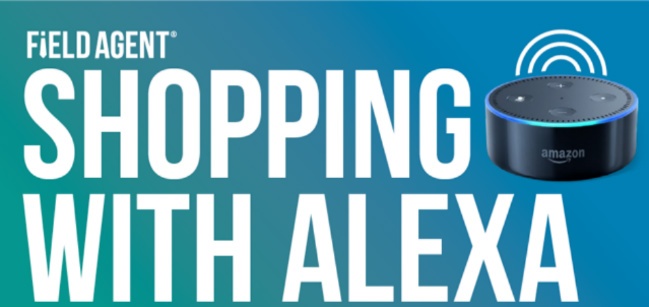Field Agent: Consumers slow to use ‘Alexa’ for online ordering
by March 3, 2017 10:26 am 666 views

Personal assistant electronics like Alexa and Siri are proving to be useful among consumers of all ages, according to a recent consumer survey completed by Fayetteville-based Field Agent. While sales of these connectable tech gadgets are growing, consumers are still mostly using them to answer simple questions and stream music.
Field Agent surveyed 318 consumers across the nation who own Echo, Echo Dot or Amazon Tap gadgets and use the personal assistant Alexa in their daily lives. One quarter of the respondent were between the ages 25 and 34, 37% of the respondents were between 35 and 44, 25% were between the ages of 45 and 54, and 10% of users are senior citizens. Respondents in the survey also included residents in the largest metro areas of the Natural State.
Overwhelmingly, 96% of Echo users say they regularly stream music with the devices and 91% say they routinely ask Alexa about the weather and television listings, according to the survey. Slightly more than one-third of users rely on the devices to maintain their shopping lists or control the smart home devices like locking the door or changing the thermostat.
One-quarter of users ask Alexa to find restaurants for them, but they are not yet actively asking the device to order food on their behalf. Just 17% of users say they ask Alexa to track their online orders of goods previously purchased and the same number said they allow Alexa to add items into online shopping carts.
Just 8% of users are already allowing Alexa to repurchase items they have bought before, or shop for items they have not purchased before. Even less users are asking Alexa to send an email or text on their behalf and only 1% of users are comfortable enough to allow Alexa to assess their personal banking or financial information.
Field Agent said 65% of users have never made a purchase using Alexa. Because so few users are making purchases via their Echo devices, Field Agent asked respondents to explain their resistance given the devices are seen as a convenience play for retail. Their top reasons shared by respondents are:
- Inability to see the purchases
- Unable to compare prices before the purchase
- Security concerns of sharing financial data
- Concerned children will make purchases accidentally
“I am not 100% familiar with the process. Also I like to see an overview of a product that I am ordering and my order confirmation as I am giving the final ok to purchase. If I can’t see it then I am hesitant to make the purchase,” one respondent answered.
Another respondent said she’s concerned her young children will talk to Alexa and make purchases without knowing, so she has turned off that function for now.
Those using Alexa to make purchases on their behalf said they primarily download music (43%). Nearly as many (38%) said they have purchased household supplies such as trash bags and toilet paper, while 36% said they have ordered pet supplies. Just a small percentage of respondents with babies have used Alexa to order baby supplies. This minority of Echo users that uses the purchase function said they buy the following:
- Electronics 27%
- Gifts 25%
- Home goods 17%
- Packaged foods 15%
- Ready-to-eat meals 8%
- Movie tickets 7%
- Beverages like coffee or soda 7%
The top reasons Echo users like making purchases with Alexa is because it’s easy, especially for replenishing frequently purchased items like dog food. One user said Alexa helps her compile a more complete shopping list because if she runs out of something while cooking, she can immediately ask Alexa to add it to the list and not rely on trying to remembering to write it down later.
However, some users said Alexa sometimes doesn’t hear them correctly. They also like to see what they are ordering and compare prices and other product specs themselves before they buy.
More than half (56%) of respondents said they prefer to use their computer or tablet to purchase items online, while 44% said they use their smartphones to make purchases most often. Just 1% of Echo owners said they use that device to make the majority of online purchases.
Data from Consumer Intelligence Research Partners indicates 8.2 million U.S consumers own one of the voice-activated digital assistant devices after strong sales this past holiday season of 3.1 million device. But the Field Agent research indicates it will likely take more time before these new users are comfortable enough with Alexa to give her their wallet.
